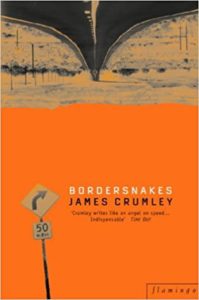I stumbled upon James Crumley’s name amid a list of recommended crime novels. His novel, The Last Good Kiss, apparently rated as one of the best crime novels of the last century, featuring a tough gumshoe by the name of C. W. Sughrue. Other writers hail Crumley as a genius in the field, while readers still haven’t flocked to his books en masse.
Crumley’s style is uniquely American, hewing to the hardboiled sub-genre of crime fiction, with tough men and tougher women. Live is short, hard, and often involves guns, liquor, and deadly relationships.

Bordersnakes, originally published in 1996, is the second Crumley novel I’ve read, kicks up the hardboiled feel a notch or two. The description at the back reads like something from a melodramatic Twilight Zone episode: two tough guys on “a death trip across a country called Texas, to a state of mind called revenge.” Texas, although one of the fifty states in the union, often is considered both another country and a state of mind, and features heavily but not solely as the setting of the novel, which ranges from California to Montana, New Mexico and old Mexico, to almost every corner of Texas. Sughrue and Milo drive and fly from El Paso to Austin, San Antonio to the Valley, to Kerrville and the Hill Country west of Austin, and along the various towns of West Texas between El Paso and San Angelo, and finally across the border into Mexico.
Crumley wrote several novels that featured Sughrue, yet he also introduced another private detective protagonist in his own series of novels. Sticking to names that are difficult to spell, this detective is Milo Milodragovitch, a former cop based out Montana like Sughrue. In Bordersnakes, the two men join forces in dual quests for revenge that, like all fiction, seem disconnected but are tightly intertwined. This makes the resolution simple, as two problems are solved with one bullet, in a manner of speaking.
Crumley’s style is rife with adjectives and contrasts. In a run-down motel, “[t]wo puke-plastic chain lights flank the filthy bed with dim stagnant streams from forty-watt bulbs.” Later, at a party held by a former general at his ranch in West Texas, with Hollywood actors and washed up directors, a rattlesnake appears on the lawn. One of the female guests shrieks and then pulls a Smith and Wesson “Ladysmith Auto” from her purse and kills it, prompting all the other guests to drawn their weapons before realizing none of the guests were the targets. It’s almost comical, but fits in with the general perception that all Texans carry guns.
The story itself features two main threads. In the first, Sughrue is shot in the gut and left to die in a ditch. He recovers, slips into a funk until Milo appears and sets him on the righteous path of revenge. The second thread features Milo, whose inheritance worth multi-million dollars has been siphoned from a bank account and the perpetrators vanished. Although apparently not worth much, Milo throws around money as if it’s renewable paper in his effort to grease the gears needed to reclaim his full fortune. When Milo shows up looking for Sughrue and the start their journey across the Southwest, they bounce around like confused pinballs. Their first trip recreates Sughrue’s shooting, which leads to a gun traced back to an accountant in Austin. Discovering the accountant and his wife dead, they rescue their dog shot by the killers and drop it off at an emergency clinic, before resuming their connect-the-dots journey from person to person, each one more devious and vicious than the last. There are no coincidences in this novel, and every character leads somewhere, every person is connected to their goals. Yet even were they both to succeed, I got the feeling they enjoy this journey too much to really care about the end result.
Many of the settings and landscapes in the novel were familiar to me, especially the locations in Austin and West Texas. A good part of the novel takes place in Austin, around the same time I lived in that city and traipsed around to many of the same places. Since it was published in 1996 and probably written a year or two earlier, it took place at the exact same time as I drove around the city, from Mount Bonnell to Town Lake and in between.
In terms of American crime novels in general and hardboiled in particular I’ve still a neophyte. I see echoes of Raymond Chandler, John D. MacDonald, and Joe R. Lansdale in Crumley’s fiction. It’s likely I’ve not yet read widely enough, and therefore these authors’ styles all bleed together. Having read quite a few of Lansdale’s novels, many of which have the same style, tone, topic, sense of violence and occasional poetry, I could not help but think of those two writers somehow connected at the literary hip. Much of Lansdale’s fiction takes place in Texas, like Bordersnakes. I didn’t get as deep a sense of similarity with Crumley’s more famous novel, The Last Good Kiss, which took place in California and Montana, but this one feel like an extension of Lansdale’s fictional world, especially his Hap and Leonard novels.
There are several other novels with Sughrue and Milodragovitch. I suspect I’ll read them as I find them, but in small doses. There are distinct differences between European crime fiction and American crime fiction, and I still find myself favoring the former over the latter.